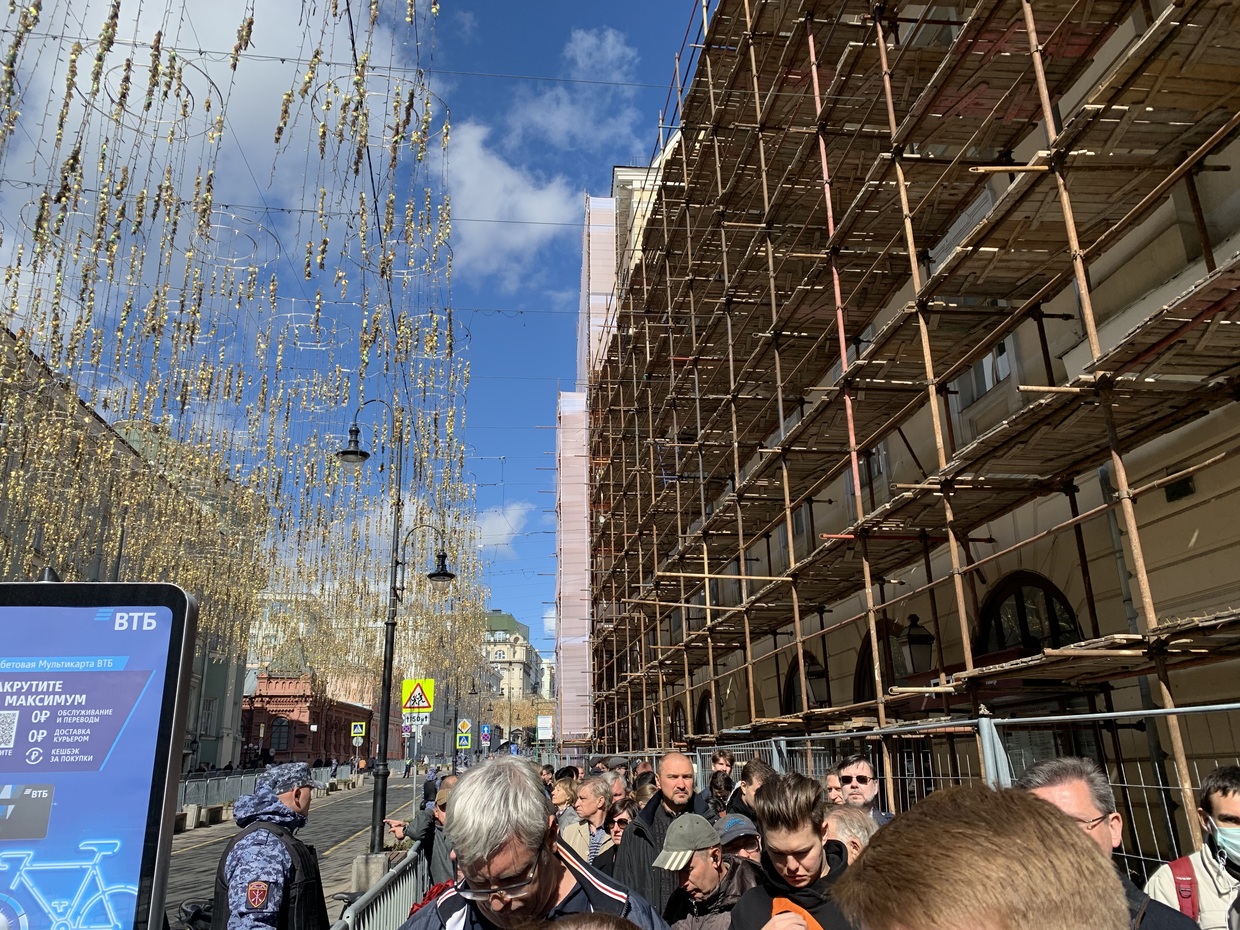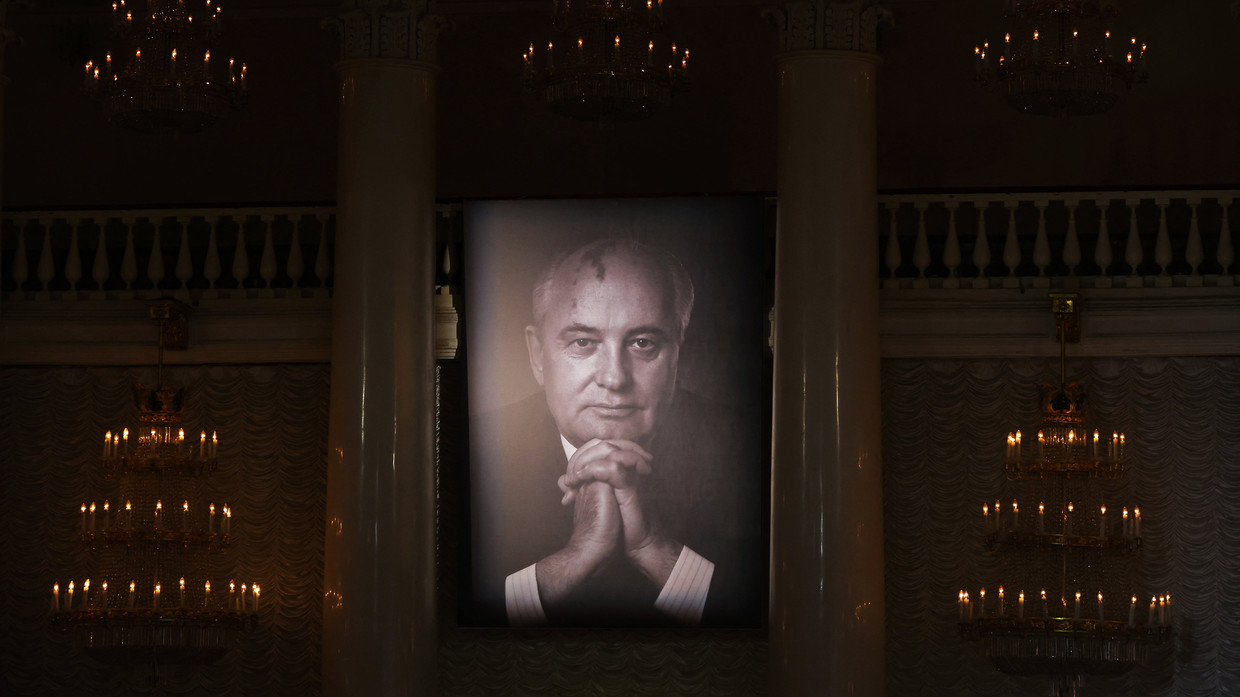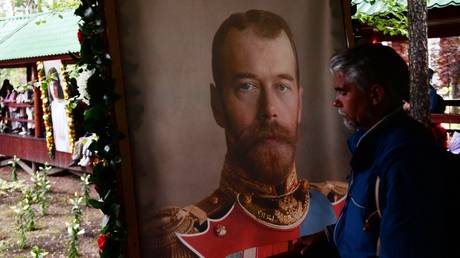Mikhail Gorbachev, the first and last president of the Soviet Union, died at the age of 91 last week. On Saturday, his farewell ceremony was held in Moscow.
One of the last political giants of the last century, Gorbachev was a symbol of his era, but reaction to his death revealed the controversial nature of his legacy. He was given only some elements of a state funeral, and Hungary's prime minister was the sole Western leader to attend his farewell. Even in the Russian capital of around 20 million people, only a few hundred went to say goodbye in person.
RT explains how an uncomfortable symbol of a long gone era was sent on his final journey.
The unfulfilled future
Many passed by the open casket containing Gorbachev’s body: Hundreds of ordinary Russians, individual celebrities from the country’s politics and culture, and ambassadors from EU states and the US.
Gorbachev’s supporters, long since departed from politics, did not view his physical departure as a disaster – but symbolically, his farewell was still an opportunity to recall the end of the Soviet Union and the beginning of the new Russian state.

Hundreds of people stood in line to say goodbye to Gorbachev. Perhaps, some of the excitement was due to the fact that the most recent funeral of someone of his stature was held as many as 15 years ago. Then, at the age of 76 and in the same Central Clinical Hospital in Moscow, the first president of the Russian Federation, Boris Yeltsin, died.
However, it can hardly be said that the majority of post-Soviet Russians view Mikhail Gorbachev positively.
Local government from Gorbachev’s home region of Stavropol, where he served as head for almost ten years, did not find it necessary to commemorate their compatriot on a large scale. Only in the village of Privolnoye, Gorbachev's birthplace, was a mourning portrait placed in the local administration building.
Those gathered in the center of the capital on that weekend morning repeated to journalists and each other that they were uniting around common Perestroika values, remembering their lost youth, or an alternative future “according to Gorbachev,” which had not come to pass.
Of course, the figure of the last general secretary himself was also important – primarily symbolically. The general mood of those who came to say goodbye to Gorbachev seemed to be calm; it would be a stretch to call it gloomy.
Gorbachev had long been absent from political life in the country, and his sympathizers had stopped counting on any return.
Thirty years ago, however, hopes were still alive and well. In the early 1990s, Gorbachev hinted at unexpected scenarios in his biography: “Charles de Gaulle returned to rule the country when he was 68. And I am only 61.” In 1996, he ran for president – and received less than 1% of the vote.
What Gorbachev will be remembered for
The farewell ceremony was held in the Hall of Columns. The building was erected in the first half of the 18th century for Prince V.M. Dolgoruky-Krymsky. After October 1917, noble balls and concerts by Pyotr Tchaikovsky, Richard Strauss, and Franz Liszt were replaced by New Year’s parties for Soviet children and the World Congress of Soviet Friends. After the collapse of the Soviet state, the House of the Unions “had new directions of activity, corresponding to the course of democratic transformations in the Russian Federation.” Among the building's modern functions were funeral ceremonies.
From the early hours of Saturday, September 3, people began lining up to say goodbye to Mikhail Gorbachev. The Moscow authorities introduced security measures and restricted pedestrian movement along some central city streets.
To see the general secretary for the last time, a visitor had to wait their turn in the street, then go up the stairs of the former Noble Assembly House and walk among the three-tiered chandeliers and high columns of the solemnly decorated Column Hall. Slowly, one by one, people bade farewell to the politician – with and without flowers. His face could be seen a few yards from the symbolic fence.
Those born after Gorbachev stepped down as president and those who experienced the ups and downs of Gorbachev’s rule in their teens also came to bid farewell.
A 23-year-old political science student named Ivan said Gorbachev “did all the democratic stuff and stepped aside."
“I think on the whole it turned out pretty well. There were problems, and my parents told me a lot about them, and they told me today too, when I was going to say goodbye. They didn't discourage me, of course, I explained to them that it wasn't a demonstration or anything like that. But we disagreed with them on this subject. I have great respect for Gorbachev, first of all, for open borders, for freedom. Without him, we wouldn't have had it. And I travelled around the world with my parents thanks to his views, his steps. That is why I am here.”
Alexei, a 50-year-old lawyer, spoke about the religious significance of Gorbachev to his family:
“My grandmother used to pray to him on TV. And my great-grandmother used to cry on every anniversary of Stalin's death. In front of the same TV, by the way. They both didn't live to see it [the Soviet collapse], but I'm grateful to Gorbachev, of course. For what? I've lived and seen everything. I've been to a lot of places. It's that simple. We took this course at the time.”
Forgotten abroad…
Ivan, Alexey and many others in the crowd would later learn that the US, German, British, and French ambassadors to Russia – John Sullivan, Geza Andreas von Geir, Deborah Bronnert, and Pierre Levy, respectively – also walked past the open casket of the last general secretary.
The next day, Sullivan ended his tenure and left Moscow, apparently due to the death of a close family member. Saying goodbye to Gorbachev was apparently the last significant ceremony of the diplomat's Moscow tenure.
Hungarian Prime Minister Viktor Orban also laid flowers. Orban personally offered his condolences to Gorbachev’s family and later wrote that the politician was “needed by Central Europe to free itself from communism peacefully, without loss of life or bloodshed.”
Orban was the only head of state at the ceremony. Neither Romania, Bulgaria, Slovakia, Poland, nor any other country that gained independence as a result of Gorbachev's foreign policy, found it necessary to pay tribute to the man who stood at the origins of their freedom. Perhaps their current disagreements with Russia are far more important to them than Gorbachev's role in their history.
Nor did leaders or representatives from post-Soviet states – from the Baltic and the Transcaucasus to Belarus and Central Asia, not to mention Ukraine – attend the funeral. These countries often speak negatively of the Soviet period, but they do not speak well of Gorbachev either.
Of the foreigners, Germans were most interested in saying goodbye to Gorbachev – the last Soviet general secretary was personally responsible for the reunification of West and East Germany into a single state. There were many journalists at the ceremony from the country. In good Russian with a distinctive accent, they asked those attending what the last general secretary meant to them personally.
Just two months before Gorbachev’s death, a letter to the Soviet president from Dresden was published on his foundation’s website.
“I am writing to you to express my heartfelt gratitude for everything you have done for me, for the people of Germany and for the world.” The author of these words, Thomas Bottrich, born in the GDR in 1955, later “participated in church peace initiatives and in the 1980s wrote letters to Helmut Kohl and Erich Honecker, urging them to support the withdrawal of nuclear weapons from Germany.”
Bottrich was at first opposed to Kohl’s desire to unite Germany quickly, but he soon changed his mind.
Gorbachev’s daughter Irina, who organized the funeral, also lives in Germany with her children. Sociologist Igor Chubais was born in Soviet-occupied East Berlin in 1947 and came to the funeral ceremony; Igor is the elder brother of the reformer, former finance minister, and former head of the Russian presidential administration, Anatoly Chubais, living in exile since the start of the conflict in Ukraine.
Elena, a middle-aged Czech translator who attended the ceremony, says she essentially owes her profession to Gorbachev:
“It so happened that when I entered MGIMO [a higher education institution that has trained staff for the Soviet and then Russian Foreign Ministry since the 1944], they didn’t ask us who wanted to learn what language. I was allocated Czech. Well, at that time it was quite prestigious and it was really possible to go there. Before the collapse [of the USSR] I visited three or four times. I studied the country’s history, regional studies, the history of our relations with them, everything as it should be. And we had different periods – something they loved us for, something they can remember us for. And they remembered me personally. Now there is hell in the sense of Russophobia – although you probably know about Theresienstadt [a Nazi concentration camp established in the Czech Republic in 1941], so they must understand once and for all that you must not behave this way. Nevertheless, Gorbachev somehow managed to reconcile us to the Czech Republic, at least temporarily. This is partly the reason why I translated a lot of things and achieved a lot in my narrow field. And I say thank you for that. I will lay flowers for him. Here’s the reason.”
The Czechs themselves do not remember this rapprochement of their country with Russia – there were no representatives from Prague at the ceremony.
Not far away, behind rows of reporters and cameramen, a woman in a wheelchair, the same age as Gorbachev, was hiding. Suzanne Massie, 91-years-old and a former adviser to the 40th president of the United States, Ronald Reagan, she is a longtime student of Russian history and no stranger to the personal and political relationships between the two leaders of the 1980s. Massie told RIA Novosti that Gorbachev “revealed to us [Americans] the Russians.” Less than a year ago, Massie herself became a Russian citizen.
… and cursed in his homeland
The procedure for burying state officials in Russia is regulated by several laws. Presidents of Russia and their Soviet equivalent should be buried with different honors. But if you look at it from the point of view that the Russian Federation is officially the legal successor of the USSR, there is technically no difference between Boris Yeltsin and Mikhail Gorbachev.
In 2007, Yeltsin was bade farewell in the country’s main church, the Cathedral of Christ the Savior. It was open for a whole day so that everyone who wished to say goodbye to the former president could do so –some 25,000 people. National mourning was declared, and the current president, Vladimir Putin, attended the funeral in person.
There was nothing of the sort at Mikhail Gorbachev’s farewell. His farewell and funeral were far more modest than those of Evgeny Zinichev, the head of EMERCOM, who died last year, or even the opera singer Dmitry Hvorostovsky, who passed away in 2018.
Perhaps this was again due to the ambiguous legacy of the first and last president of the USSR.
There was no sign of President Putin at Gorbachev’s farewell – the Kremlin attributed this to his busy schedule. Nevertheless, Putin did find an opportunity to say goodbye to the Soviet president: Last Thursday, he stopped by the Central Clinical Hospital and laid flowers at his coffin before traveling to Kaliningrad Region.
In Putin’s absence, the highest-ranking Russian politician who attended Gorbachev’s farewell service was former President Dmitry Medvedev, now deputy chairman of Russia’s Security Council. At 11am on Saturday, Medvedev wrote on Telegram that Gorbachev’s funeral would take place that very day, but his post was not about him or about the “root causes of the collapse” of the USSR.
Medvedev said:
“For all the difference in assessments of the behaviour of the top leaders of the USSR and Russia at the time, it should be noted that they had the good sense not to allow the giant nuclear arsenal of the Union to be divided up by the newly formed national states. The consequences could have been swift and disastrous for our small earthly world. The entire strategic nuclear arsenal then remained in our country. And we maintain it at a very high level. And this is the best guarantee for the preservation of Great Russia.”
The ceremony was also attended by figures from Russian culture, journalism, and the clergy. They included Alla Pugacheva, People’s Artist of the USSR, Nobel Peace Prize laureate and journalist Dmitry Muratov, and Father Alexey Uminsky, Rector of the Holy Trinity Church in Khokhly.
It cannot be said that these people are not "in favor" with the current Russian authorities, but society is extremely ambivalent about them, especially since the start of the military operation in Ukraine.
Silent Moscow
The streets outside the House of Unions on the weekend morning seemed empty. Muscovites, strolling by the luxury clothing shops came across the event. In private conversations, they shared their bewilderment. Not everyone seemed to be aware of the reason for the crowds.
An exception to this were two well-informed men: An older man in a leather jacket and a younger man wearing a hoodie with a Z emblem and a sign reading ‘We do not abandon our own’. The former stubbornly argues to the latter that Gorbachev did more good than harm. Among the arguments are the withdrawal of troops from Afghanistan in 1989, the prohibition of alcohol, and Glasnost and Perestroika, which have entered the English language along with the earlier ‘sputnik’ and ‘pogrom’. The man in the hoodie agrees that the anti-booze campaign was positive, but in response to the other points, he shakes his head.
At around 1pm, the megaphones start announcing that entry into the Hall of Columns would cease, but some latecomers with bouquets were still allowed in. At about 2pm, the ceremony came to an end.
Gorbachev’s body was taken to Novodevichy Cemetery. There, he was buried next to Raisa Maximovna, the former first lady, who has often been compared to her contemporary, Nancy Reagan.
People gradually leave the scene, and there are no obstacles to walking around the center of Moscow. Nor are there any reminders of the farewell ceremony that has just concluded.


